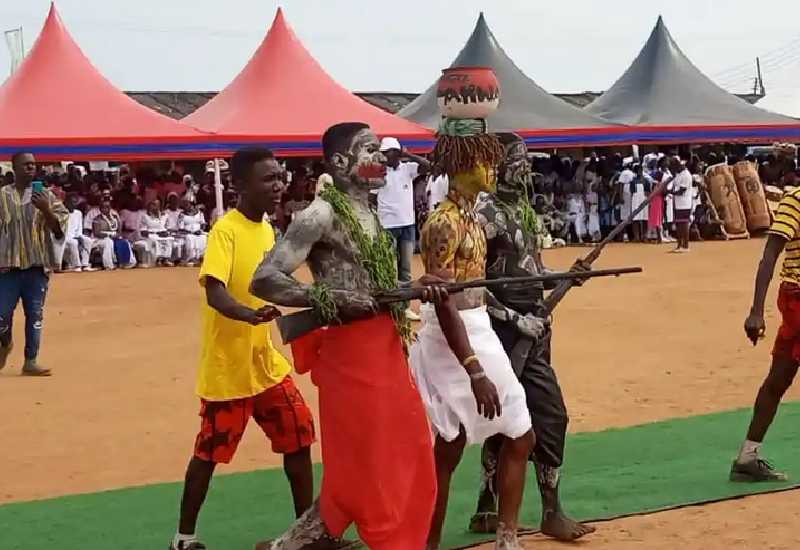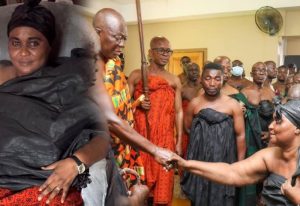It was a grandeur of dignity, class and a fascinating cultural masterpiece as hundreds touched the ancient seaside town of Moree in the Abura-Asebu-Kwamankese District of the Central Region on Saturday to celebrate the Abangye festival.
The annual celebration bounced back in full force last year after 20 years on hold due to a protracted chieftaincy dispute in the area.
‘Abangye’, a Fanti word which means Fencing, was an annual activity in the pre-colonial times when the Asafo companies of the coastal town, went to the bush singing and chanting to cut sticks and fresh palm fronts to fence the abode of their gods.
Even though the practice has ceased due to the introduction of blocks to replace the fencing sticks, the week-long activity is still observed annually as the Abangye festival.
The festival is a period where only men who have children are allowed to go into the bush to cart palm branches to fence the community’s armoury.
Geared towards reuniting the people to set the pace for rapid development, this year’s festival is being held on the theme: “War against indiscipline, the role of citizens.”
In a grand style, the Chiefs and people processed from the palace through the principal streets and converged at the Moree D/A basic school grounds for a colourful durbar to climax the week-long celebrations.
The procession was led by the various traditional militias (Asafo companies), namely Bentsir, Alata, and Nkum who displayed various traditional and cultural gymnastics to the admiration of all.
Joining the procession were Hundreds of youth groups, professional associations, trade associations and others from the Diaspora.
Addressing the people, Nana Obokese Ampah I, Regent of Moree, thanked the people for fostering peace and unity as a prerequisite for development.
He urged the people to bury their differences as they observed environmental cleanliness to enable them to stay healthy.
The attitude of some people throwing garbage into gutters and defecating in open places does not augur well for the environment and must be stopped, he advised.
Nana Obokese Ampah urged the government to redeem its promise to construct a Daycare Centre at Moree landing beach and also construct the road leading to the site to befit its status.
Equally, he called on the government to convert the Moree Day School into boarding and upgrade other infrastructure in the school to enhance teaching and learning.
Some outstanding personalities including Mr. Kwame Nsiah-Apau, known by his stage name as Okyeame Kwame, a musician, songwriter, creative director, and entrepreneur were rewarded for their commitment to the development of the community.
Mrs. Catherine Ablema Afeku, former Minister of Tourism, Arts, and Culture, and the lead of Strategic Communication of the National Coordination Office of the Africa Continental Free Trade Area was also recognised.
The two were enstooled, Adwumapahen and Adwumapahenmaa in Moree.
History has it that Moree was founded by giants; Asebu Amanfi and his brother Farnyi Kwegya, and a renowned hunter called Adzekese.
Asebu Amanfi and Farnyi Kwegya were believed to have led an army that chased Israelites during the exodus.
When their men drowned in the sea, they could not return to Pharaoh but fled Egypt with their families across Lake Chad to Nigeria and finally settled in Moree, then a small seaside village in Ghana.
Upon arrival in Moree, the Egyptian giants established their kingdom with Adzekese, a prolific hunter from the Area.
Asebu Amanfi was made the first King of the Asebu kingdom whilst Nana Adzekese became the first Chief of Moree.
The Moree community developed around Fort Nassau, which was the original fort on the then-Gold Coast.
Ashantibiz




